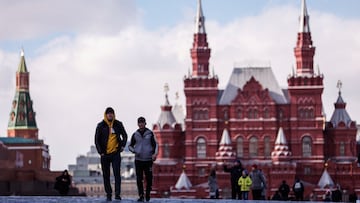How is the Russian economy doing after six months of war in Ukraine?
Vladimir Putin’s decision to invade Ukraine saw tough economic sanctions imposed on Russia but the country’s economy has remained afloat so far.

Since Russian forces invaded Ukraine in February, Western powers have attempted to form an international coalition to exert pressure on the Russian economy. Countless layers of economic sanctions have been levied against the Kremlin and senior Russian figures in an attempt to force President Vladimir Putin to relent.
But have these measures worked? The sanctions imposed on Russia have served to make vital resources like oil, natural gas and grains scarcer, pushing up prices for consumers around the world.
Back in April a senior US Treasury official claimed that the Russian economy would struggle to operate as normal without being able to trade with the West. President Biden imposed a blanket ban on all Russian-produced energy products, which is the most important part of Russia’s economy.
Related news:
“The economic consequences Russia is facing are severe: high inflation that will only get higher, and deep recession that will only get deeper,” the official told reporters.
In the short term the oil-based economy has found other outlets around the world and has increased trade with China and India, who have both leapt at the opportunity to pick up some cheap Russian oil. In the first half of 2022, for example, India increased seaborne imports of Russian oil by more than 1,700%.
It has not been the instant collapse that Biden and his allies would have hoped for, but the Russian economy is certainly hurting from the sanctions placed upon it. Earlier this year the ruble slumped to a record low against the US dollar, a direct result of a decision to freeze half of Russian’s $600 billion in foreign currency reserves.
In December a European embargo on 90% of Russia’s oil will come into effect, dropping the demand by around 2 million barrels per day. Unless Russia can find new buyers it will have little choice but to offer further reductions.
Russian industry adapts to loss of Western chains
Aside from the government-led bans on Russian products, countless major retailers and brands have decided to leave the Russian market on their own terms. McDonalds, Starbucks and Mastercard were some of the most prominent names to exit the country earlier this year.
However the Kremlin had been preparing for such a step and had taken precautions to ensure that the country could be as self-sufficient as possible.
The storefronts that used to house McDonalds restaurants are now filled with Russian-owned burger joint “Vkusno i tochka”, which translates to “Tasty, and that’s it.” Starbucks has been replaced with the barely disguised “Stars Coffee.”
The Russian government had spent years encouraging these Western brands to localise their supply chains, using Russia-made products wherever possible. This has meant that, although the brand itself no longer operates in Russia, there are local suppliers and manufacturers that can be repurposed by Russian businesses, requiring little more than a change of packaging to continue selling the products.
Perhaps even more crucially, Russia set up its own transaction processing system and Mir credit card, to reduce its reliance of overseas-based financial products.
Andrey Nechaev, former Russian economy minister, explained: “The exit of Mastercard, Visa, it barely had an impact on domestic payments because the central bank had its own alternative system of payments.”






